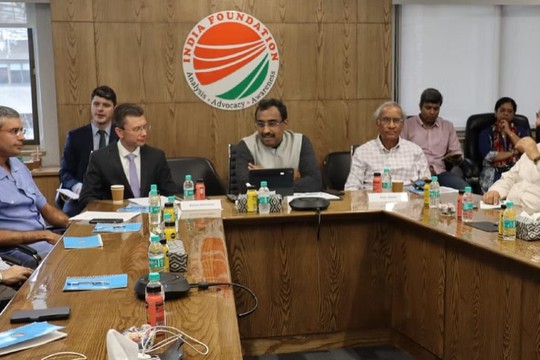Dr Zorawar Daulet Singh, Roman Babushkin, Ram Madhav & Ambassador Rajiv Bhatia during India Foundation roundtable in New Delhi.
Photo: The Print
Building an effective independent settlement and payment infrastructure is a priority in the financial track of BRICS, Roman Babushkin, minister-counsellor and deputy chief of mission at the embassy of the Russian Federation in India, said, ‘The Print’ informs. Speaking at a roundtable organised by the India Foundation on “BRICS Expansion and Currencies”, Babushkin said BRICS members have been taking “consistent steps to switch to settlements in national currencies for quite some time now and working out new payment mechanisms”.
Brazilian President Luiz Inácio Lula da Silva, while on a state visit to China in April, had made an impassioned plea for nations to trade in local currencies. China and Brazil have reportedly agreed to drop the US dollar for trade between them as reported by ‘The Print’ earlier in June. President Lula had also proposed the creation of a single BRICS currency.
Speaking at the BRICS summit last year, Russian President Vladimir Putin too mentioned an international reserve currency with its basis in the basket of currencies of BRICS countries, Babushkin said. He added that these ideas and proposals “demonstrate new tendencies” but it is clear that a lot of “aspects” around a new currency require in-depth study.
Ambassador Rajiv Bhatia, a former ambassador and a distinguished fellow, foreign studies programme at Gateway House and Zorawar Daulet Singh, author and founder of NorthCap University and an adjunct fellow at the Institute of Chinese Studies, New Delhi, were other panellists at the discussion chaired by Ram Madhav, president of the India Foundation.
In his opening remarks, Babushkin said BRICS is not aimed at anyone but rather offers “alternative instruments”, which are supposed to be safe from the politicised Western architecture — including in the context of de-dollarisation. “In BRICS, there is no place for a dictate (sic!), domination, unilateral and confrontational approaches, sanctions, weaponisation of economy and currencies, as well as interference in domestic affairs.”
He also said that BRICS is an example of a new formation of flexible integration based on consensus, with over 70 formats of practical cooperation, structured around three pillars — policy and security, economy and finance as well as humanitarian ties — making this association stronger than any agreement-based supranational alliance or bloc. This, he emphasised, makes BRICS an attractive option for countries that share similar views and values.
Zorawar Daulet Singh highlighted that by creating BRICS and showing that it could work, the five nations are projecting an alternative to the current West-led global order.
While BRICS countries have always been pro-engagement economically with the West, they do not wish for such engagement to come with strings attached, which is the norm with western foreign policy, Singh added.
The larger issue surrounding the politicisation of the US dollar and the fact that the US froze $300 billion of Russian assets in response to the war in Ukraine has led to a loss of faith in the US dollar as a global currency, he said. This, he explained, has made it difficult even for the BRICS-affiliated New Development Bank — a success of the BRICS association that all three speakers highlighted — to fund projects in Russia.
Ambassador Bhatia in his opening remarks outlined that the 15th BRICS Summit, to be held in Johannesburg between 22 and 24 August, will be special as 49 leaders from Africa are expected to attend it, along with other leaders from the developing world.
Ambassador Bhatia further said that the central mission of BRICS is to “present a non-western view of the world” and not an anti-West view.
On India and Brazil’s position on expansion of BRICS, he added that the two nations are looking for a clear criteria for membership — highlighting that they could adopt a method similar to that of the Shanghai Cooperation Organisation (SCO), an organisation of which Russia, China and India are also members, where interested countries would have to first become a dialogue partner before becoming a permanent member.
read more in our Telegram-channel https://t.me/The_International_Affairs

 9:57 16.08.2023 •
9:57 16.08.2023 •























